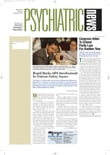Schizophrenia may, in a sense, help keep the tobacco industry alive. Some three-fourths of American schizophrenia patients—about three times the rate in the general population—are estimated to be nicotine dependent and to smoke some $20 billion worth of cigarettes annually.
But why do so many schizophrenia patients have such a strong urge to smoke? Although psychiatric researchers have made some efforts to answer the question, they still aren’t sure.
However, a Japanese study suggested that schizophrenia patients might smoke to combat the negative symptoms of the illness. And now a new investigation implies that they smoke not only for this reason but to counter four other symptoms as well—poor attention, disorientation, unusual thought content, and poor impulse control.
This study was headed by Ashwin Patkar, M.D., an associate professor of psychiatry at Thomas Jefferson University in Philadelphia, and is reported in the September Journal of Nervous and Mental Disease.
Steven Batki, M.D., a professor of psychiatry at SUNY Upstate Medical University in Syracuse, N.Y., is doing research similar to that of Patkar and his team. As he told Psychiatric News, “The study by Patkar and colleagues is an important contribution to the growing literature examining the relationship of nicotine dependence to symptom patterns in individuals with schizophrenia.”
Patkar and his colleagues decided to launch a study to investigate the relationship between positive and negative symptoms and tobacco smoking in people with schizophrenia. The researchers recruited subjects for their study from schizophrenia patients admitted to Thomas Jefferson University Hospital. Eighty-seven patients agreed to participate.
Sixty-six of these subjects (76 percent) were found to be smokers. Patkar and his coworkers gave the smokers the Fagerstrom Test for Nicotine Dependence, a widely used and validated six-item questionnaire to assess the severity of smoking. A score on the test can range from 0 to 10, and the average score for their smoking subjects was 6. Relevant clinical data such as demographics, duration of illness, illegal drug use, alcohol use, and antipsychotic medication doses were recorded. Subjects were also tested with the Positive and Negative Syndrome Scale to find out how many positive symptoms, negative symptoms, and general psychopathology symptoms they were experiencing and to what extent.
The researchers found that subjects who smoked were significantly more likely to have a longer duration of schizophrenic illness and a greater number of hospitalizations despite their slightly younger age. This finding suggested that disease severity might be a risk factor for smoking by schizophrenia patients. They also found that smokers were more likely to have reported more days of alcohol use in the month prior to hospital admission than nonsmokers. This finding suggested that alcohol use might also be a risk factor for smoking by schizophrenia patients. However, there were no statistically significant differences between the smokers and nonsmokers regarding demographic variables, illicit drug use, or typical or atypical antipsychotic medication doses.
The investigators then compared smoking subjects’ scores on the Fagerstrom Test for Nicotine Dependence with their scores on the Positive and Negative Syndrome Scale to see whether they could make any connections between the two. The researchers found a statistically significant link between nicotine dependence scores and total negative symptom scores, and also between nicotine dependence scores and scores on the negative symptom subscales of difficulty in abstract thinking, stereotyped thinking, social withdrawal, and blunted emotions. They also found a statistically significant link between nicotine dependence scores and scores on four general psychopathology symptoms—poor attention, disorientation, unusual thought content, and poor impulse control. However, they could find no statistically significant association between nicotine dependence scores and scores on the positive symptoms, such as auditory hallucinations and delusions.
Thus, schizophrenia patients may smoke, at least in part, to counteract negative symptoms and symptoms reflecting impairment in attention, orientation, thinking, and impulse control in schizophrenia, Patkar and his team speculated in their study report.
Indeed, there is other evidence to bolster this speculation, they pointed out—for instance, nicotine seems to improve cognition in schizophrenia patients, and the atypical antipsychotic medication clozapine, which is effective against negative symptoms, also appears to decrease smoking in schizophrenia patients.
But if nicotine helps get schizophrenia patients’ cognition back on track, how does it do it? One possibility is that it interacts with a particular receptor on nerves that use the neurotransmitter acetylcholine. The receptor is called the alpha 7 nicotinic cholinergic receptor. Specifically, this receptor appears to be activated by nicotine, seems to be crucial for attention and thinking, and appears to be faulty in the brains of schizophrenia patients. Thus, schizophrenia patients may smoke to jump-start the faulty receptor in their brains, and once the flawed receptor is activated, it may in turn facilitate attention and thinking.
This alpha 7 nicotinic cholinergic receptor, in fact, is of keen interest to some scientists looking for new, more effective medications for schizophrenia. Back in 2000, for example, Robert Freedman, M.D., chair of psychiatry at the University of Colorado School of Medicine in Denver, had gotten some encouraging results in experimental animals with a drug that acts on this nicotinic receptor. He planned to test the drug in some schizophrenia patients as soon as the U.S. Food and Drug Administration gave him the green light to do so (Psychiatric News, March 17, 2000).
However, as of this fall, he has no results to report, Freedman told Psychiatric News.
